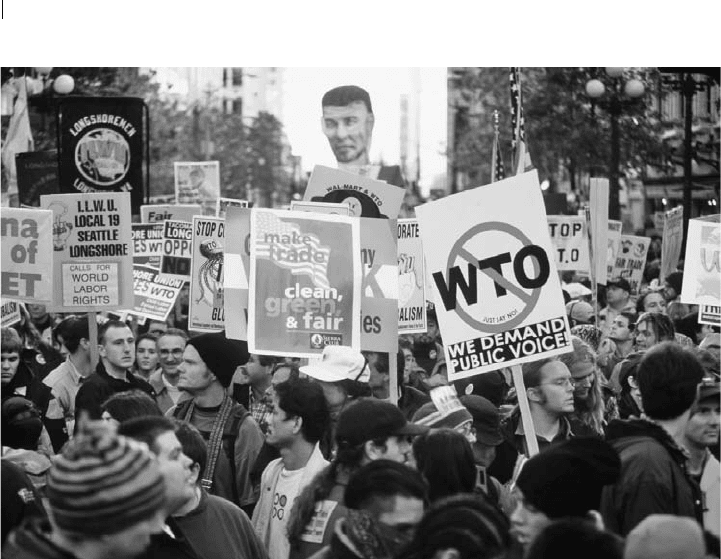Danver Steven L. (Edited). Revolts, Protests, Demonstrations, and Rebellions in American History: An Encyclopedia (ENG)
Подождите немного. Документ загружается.


On Wednesday, May 6th, HUD announced that it will approve requests to allow the
early release of over $92 million in Community Development Block Grant (CDBG) funds
to the city and County of Los Angeles that were scheduled to be released on July 1st.
On Thursday, May 7th, HUD signed an interagency memorandum of understanding
with the D epartment of Labor to better coordinate Labor’s job training efforts with
HUD’s HOPE and other public housing initiatives.
On Friday, May 8th, HUD announced the availability of $1.5 million in Technical Assis-
tance program grants for low- and moderate-income young people (between the ages of
14 and 21) to help them acquire the skills and knowledge they need to start and operate
successful small businesses.
The Resolution Trust Corporation (RTC) has made available to HUD a list of proper-
ties available in the affected area of Los Angeles. HUD has been working to match these
properties to local needs, and leases could be signed later this week.
Labor:
The Department of Labor provided $2 million in emergency grants to hire and pay the
wages of workers who were dislocated as a result of the disturbance.
Labor also launched a demonstration project to Use unemployment insurance benefit
payments to support entrepreneurship efforts by unemployment insurance claimants.
Labor also provided about $2 million for several types of training assistance. One
grant would establish “ one-stop shopping” skill centers to pr ovide vocati ona l trainin g
and employment-related assistance to affected areas. Another would finance an expan-
sion of a program operated by the Community Youth Gang Services which allows ar ea
youth to participate in community service projec ts as an alternative to in carceration. A
third would finance youth apprenticeship model programs for African-American and His-
panic males. And a fourth would provide training funds to supplement local economic
development efforts.
Office of Personnel Management:
The Director of the Office of Personnel Management authorized the conduct of a
special Combined Federal Campaign effort among Federal employees in the Los Angeles
area to help generate contributions to non-profit organizations involved in the recovery
effort. OPM has also taken steps in the past week to increase job opportunities and to
provide job counseling and stress counseling in the Los Angeles area.
VII. Continuation of the Work of the Task Force
The work of the task force will continue beyond the efforts of this first week. The task
force is committed to implementing fully the President’s directive to work with the state,
county, and city, and with the private sector, to ensure the swift delivery of needed assis-
tance and services to the people of Los Angeles.
The task force has established a structure and a set of processes to see that this direc-
tive is carried out in the weeks and months ahead.
With the return of most Deputy Secretaries to Washington, the conference calls with
State, county, city, and on-site Federal representatives are nevertheless continuing.
1118 Los Angeles Uprising (1992)

Deputy Secretary DelliBovi has returned to Los Angeles this week. Deputy Secretary
Schnabel will arrive later in the week. The task force co-chairs, Deputy Secretaries
Kearns and DelliBovi, plan to continue alternate visits to Los Angeles for as long as such
visits are helpful.
Each of the agencies represented on the task force has stationed a representative to
remain in Los Angeles. Some of these representatives will b e moved to the site of
the current Federal/State/Local coordinating office in Pasadena to ensure maximum
coordination.
The task force co-chairmen are now in the process of identifying a task force leader
to lead the task force in Los Angeles on a day-to-day basis. This leader will report regu-
larly to the co-chairmen.
In six weeks, the task force has agreed to reconvene in Los Angeles to assess the state
of the recovery effort, to meet again with state, local, and private sector officials, and to
determine what additional actions are necessary.
The task force will work diligently to support state , county, city, and private sector
efforts to help Los Angeles recover, and to make sure that the Federal government is a
constructive partner in that recovery.
VIII. Conclusion
Throughout greater Los Angeles, members of the task force witnessed inspiring signs of
hope in the wake of the tragic violence. Store owners whose shops had been looted only
days earlier rushed to replace inventory, placed plywood over their shattered windows,
and proudly painted “Open for Business” in bold letters on their newly installed plywood
facades.
Volunteers poured into the affected areas from all over the city—indeed from all over
the country. Mayor Bradley estimated that 50,000 volunteers had assisted in the cleanup
of Los Angeles in the days following the disturbances.
On one street corner in South Central, against a backdrop of a burned out shopping
center, a man opened a flower stand, in one first small step of hope and recovery.
One firefighters who had served 27 years earlier in combating the fires of Watts, pre-
dicted and observed “a much quicker recovery” than that which followed the Watts dis-
turbances, because, he said, of “the total co mmitment to cleanup and recovery on the
part of the local people.”
From the ashes of this recovery, the mem bers of the task force found blossoming a
springtime of hope. I ts most important feature was a near-consensus on the types of
measures that are ne eded not only to restore Los An geles but to ma ke its nei ghbor-
hoods stronger than they were before this incident happened.
While there is much about which to be encouraged, the task force found that this is a
very tough situation. It is estimated that unemployment in the affected area prior to the
disturbance was far higher than the national average, perhaps more than triple the
national rate. Mayor Bradley estimates that many thousands of jobs were lost as a result
of the disturbance—some permanently.
Los Angeles Uprising (1992) 1119

Virtually everyone the task force spoke to believed that private sector investment in
these neighborhoods, investment which can create jobs in the community, was the most
urgent priority. Virtually everyone the task force spoke to believed that residents of
these affected areas must be given a greater equity stake in success—the opportunity
to accumulate assets without penalty-from the welfare system, the opportunity to own
and manage their own homes, the opportunity to live in neighborhoods free from crime
and drugs. What the Federal government can provide is incentives to encourage invest-
ment that will create jobs and build local assets.
The members of the task force believe that in this emergent consensus lie the seeds
of a truly complete recovery for Los Angeles, and for all of America’s cities.
Source: Los A ngeles—A City in Stress Web site http://isd.usc.edu/~anthonya/la.htm
(accessed August 2010).
1120 Los Angeles Uprising (1992)
World Trade Organization
Protests (1999)
The protests that took place on November 30, 1999, to coincide with the first day
of the new millennial round of trade negotiations at the World Trade Organization
(WTO) Ministerial Conference of 1999 became known as the “Battle of Seattle.”
It saw at least 40,000 protesters—mainly Americans, but also some from other
countries—being involved in street protests, some violent, outside the Washington
State Convention and Trade Center.
The concept of the protest was because there would be large numbers of world
leaders meeting at Seattle, and the impact that the decisions they would make,
were capable of major changes in the world economic scene. This led to a large
number of separate groups planning protests, although many came together in
the Direct Action Network. The aim was to highlight the problems facing many
poor countries as a result of globalization.
Essentially, the protest would involve a mass march against the Washington
State Convention and Trade Center where the finance ministers and commerce
secretaries of the member states of theWTOwouldbemeeting.Itwasthefirst
American gathering of the WTO and the agenda of the ministers, secretaries, other
politicians and delegates were planning to discuss ways in which rules and regula-
tions around the world could be changed to allow for a free flow of trade around the
world, heralding, they expected, an unprecedented rise in global trade in the 21st
century. The talks were scheduled to last from November 30, until December 3.
The demonstrators were determined to push for various issues to be discussed.
For the most part, they opposed globalization, which would lead to an erosion of
cultures in many countries around the world, and worse working conditions as a
part of the “race to the bottom,” which would see countries competing against each
other to offer lower wages than their competitors to get a share of the manufactur-
ing industry trade.
The people involved in the demonstrations came from a range of groups,
including consumer lobbying organizations, farmers, feminists, and human rights
activists, as well as environmentalists, trade unionists, and anarchists—the latter
coming together to form the Direct Action Network. The Direct Action Network
was involved in a planned series of demonstrations and ac tions, which started at
1121

dawn on November 3 0. This involved some of their members taking con trol of
parts of the city as the main demonstration made for the Paramount Theater, where
the opening ceremony was scheduled to take place.
The demonstrations were so large that the police were unable to control them,
and it was not long before access to the Paramount Theater was blocked. Initially,
the authorities managed to have the opening ceremony delayed for an hour, hop-
ing to be able to clear the streets of demonstrators. However, a number of demon-
strators turned violent, while othe rs chained themselves to railings and concrete
blocks. The opening ceremony was delayed as police wearing full body armor
charged the demonstrators, firing tear gas, from 10:00 a.m.
The police had started planning for the WTO Ministerial Meeting for nine
months, but their plans were soon in tatters. When the police recognized that they
could not clear the demonstrators from around the Paramount Theater, they
advised all WTO delegates to remain in their hotels, which were cordoned off
by the p olice, and it w as decided to c ancel the opening ceremony. By this time,
demonstrators had turned their fury on symbols of U.S. capitalism such as
McDonalds, Warner Brothers, Planet Hollywood, Starbucks, and Bank of America.
The conference finally started with a plenary session at 2:00 p.m., at the Seattle
Convention Center, and the demonstrators headed there and engaged in many
1122 World Trade Organization Protests (1999)
Protesters picket outside the World Trade Organization Summit demonstration in Seattle,
February 22, 2002. (Christopher J. Morris/Corbis)

“battles” with the police, hurling missiles, and setting fire to garbage bins. By
3:00 p.m., the police had used up their entire st ock of pepper spray, and the U.S.
government wanted the police to take greater action to ensure that the WTO would
not be forced to cancel the meeting altogether—which seriously looked like a pos-
sibility. The surprise for the police was not just the number of demonstrators and
their ferocity, but also that they were so well prepared, with a clear plan of action,
and many of them wearing disguises to prevent being identified, and some also
wearing gas masks.
The Clinton administration put pressure on the mayor of Seattle, Paul Schell,
who in turn contacted the state’s governor, Gary Locke, and asked him to send in
the Nat ional Guard backed with state troopers. Locke agreed, and at 4:30 p.m., a
state of emergency was declared. Then it was announced that a curfew for down-
town Seattle w ould be en forced from 7:00 p.m. until 7:30 a.m.—the first curfew
in the city since World War II. Furthermore, there was a ban on people who were
not from the police carrying gas masks in downtown Seattle. The first day of the
“Battle of Seattle” ended with two WTO delegates and about 30 others hospital-
ized with injuries, and 68 protesters arrested.
On the second day, December 1, the police were better prepared. With all pro-
tests banned in central Seattle, police on horseback and in armored vehicles fired
tear gas and rubber bullets to drive back the demonstrators, some 504 of them
being arrested. However, on that second day, the WTO delegates were able to meet
and discuss some of the issues they had been planning to conduct.
It was not long before the focus of th e press began to turn to allegations of
heavy-handed actions by the police. It soon became apparent that some shopkeep-
ers and others not connected with the demonstration had been tear gassed, and
some of them had been arrested. There were claims that people held in custody
by the police were being beaten up, and indeed the Seattle police chief Norm
Stamper would retire a week later, largely as a result of these complaints. At the
same time, it became clear that many of the WTO delegates had not been able to
conduct the negotiations tha t had been planned, and the WTO meeting in Seattle
had been successfully disrupted.
In addition to Stamper’s resigning as police chief, Schell lost the mayorial elec-
tion in 2001 to Greg Nickels. It was claimed that the damage to businesses in
Seattle was around $20 million, with the costs incurred by the local authorities
being $9 million ($3 million more than they had budgeted for). After many legal
challenges and court battles, many demonstrators who had been arrested success-
fully fought their detention, with many paid compe nsa tion. It a lso set the scene
for subsequent protests at WTO meetings elsewhere in the world.
—Justin Corfield
World Trade Organization Protests (1999) 1123

See also all entries under Stamp Act Protests (1765); Boston Massacre (1770); Regulator
Movement (1771); Pine Tree Riot (1972); Boston Tea Party (1773); Shays’ Rebellion
(1787); Whiskey Rebellion (1794); Brooks-Baxter War (1874); Green Corn Rebellion
(1917); Battle of Athens (1946); Sagebrush Rebellion (1979–1981); Day without an
Immigrant (2006).
Further Reading
Grady, Patrick, and Macmillan, Kathleen. Seattle and Beyond: The WTO Millennium
Round. Toronto: Global Economics Ltd., 1999.
Schott, Jeffrey J. ed. The WTO after Seattle. Washington, DC: Institute for International
Economics, 2000.
Solnit, David, Rebecca Solnit, and Anuradha Mittal. The Battle of the Story of the Battle of
Seattle. Edinburgh, UK: AK Press Inc., 2008.
Thomas, Janet. The Battle in Seattle: The Story Behind and Beyond the WTO Demonstra-
tions. Golden, CO: Fulcrum Publishing, 2000.
Wallach, Lori, and Nader, Ralph. The WTO: Five Years of Reasons to Resist Corporate
Globalization. New York: Seven Stories Press, 2000.
1124 World Trade Organization Protests (1999)

Direct Action Network
The Direct Action Network brought together a number of active anarchist organi-
zations, protesters, and many others pursuing a range of causes to form a single
organization that sought to de monstrate against globalization in general, and the
World Trade Organization in particular. The organization has also been involved
in other demon strations that coincide with meetings of world leaders, and has
inspired similar groups in other countries.
The people who formed the Direct Action Network first came together in Feb-
ruary 1999, having taken some inspiration from the demonstrations held against
the APEC Summit meeting held in Vancouver in Novemb er 1997. Certai nly, the
people who planned the demonstrations against the WTO were involved for simi-
lar reasons. This was because they saw the actions which the ministers at the meet-
ing in 1999 hoped to achieve—i.e., an increase in free trade, rather than improving
the economy through the economic concept of comparative advantages, would see
some third-world governments were reducing wages and working conditions to
encourage manufacturers to use their countries in preference to others. This led
to the targeting of companies that were seen to represent U.S. commercial
imperialism.
Most of the members of the Direct Action Network were from the United
States, although because of its location, many Canadian supporters became
involved in the planning and the demonstrations held in Seattle in 1999. The
detailed planning took place throughout June and July, with plans for mass nonvio-
lent direct action in a coordinated fashion to prevent the WTO gathering from
taking place. Many of the meetings were held at Portland, with many of the early
activists coming from San Francisco, and only later did people from Seattle
become involved.
One of the major problems was to get large numbers of people to participate. To
this end, the Direct Action Network embarked on a major advertising campaign
and rallied potential protesters from supportive groups as well as students. The
Internet was also used, as was the journal Earth First! The organizers were
conscious of the need for l arge numbers, and also tight discipline to ensure that
the group would take control of the streets and hold them against any concerted
police plans.
Subsequently, some members of the Direct Action Network demonstrated at the
Republican National Convention in Philadelphia on J uly 29, 2000, and at the
Democratic National Convention in Los Angeles two weeks later. They also helped
organize protests at the inauguration of George W. Bush in Washington, D.C., on
January 20, 2001. However, it was not long before tensions within the Direct
1125

Action Network caused splits, although they did come together on
February 2, 2002, for the protests against the World Economic Forum that was
meeting in New York City.
—Justin Corfield
Further Reading
Solnit, David, Rebecca Solnit, and Anuradha Mittal. The Battle of the Story of the Battle of
Seattle. Edinburgh, UK: AK Press Inc., 2008.
Thomas, Janet. The Battle in Seattle: The Story Behind and Beyond the WTO Demonstra-
tions. Golden, CO: Fulcrum Publishing, 2000.
Economic Justice
The concept of economic justice—which w as one of the central points made by
the protesters in the demonstrations in Seattle in 1999—involved designing a
world economic system by which poorer countries would be able to develop with-
out threats to their economies or culture in the “race to the bottom” by which
governments lowered wages and working conditions to attract foreign investment.
The WTO, meanwhile, was at the forefront of promoting the economic law of
comparative advantage, by which countries would concentrate on whatever type
of industry in wh ich they had a comparative advantage—whether it was cheap er
access to resources, power, or lower labor costs.
The idealistic viewpoint of those urging for “economic justice” was that people
in third-world countries should be able to grow their crops or run their businesses
without having to cut their costs back to the extent that workers were forced to live
in poverty, or to work in unsafe workplace conditions. Much of this stemmed from
research showing that much of the cost of an item such as coffee was incurred by
the companies’ marketing and distributing the product in Western countries, a nd
that the actual amount of money paid to the growers was relatively low. On the
one hand, this could be resolved by paying more mo ney to the producers, but on
the other hand, a large number of new products started to appear on the market
in Western countries, often sold through charity outlets or delicatessens, and later
through some supermarket chains. Many of these items are branded as “fair trade”
products.
Although the “fair trade” movement started in the 1940 s, it was only in the
1990s that the products became commonplace in shops throughout Western
Europe and North America. As these “fair trade” items start to become more
common, there has been a great focus by dem onstrators, such as those at Seattle,
1126 World Trade Organization Protests (1999)

on large multinational chains such as McDonalds and Starbucks. The former was
widely criticized and was the subject of attacks during the anti-globalization pro-
tests in Seattle and e lsewhere, especially in France—there leading to the r ise of
Jose
´
Bove
´
, although this arguably had more to do with French nationalism than
any c oncept of “economic justice” for third-world producers. McDonalds and
most other companies subjected to attacks have sought to change their image .
They have embarked on programs t o reduce the use of polystyrene (in the case
of McDonalds), and many leading retailers have agreements with suppliers that
the w orkers in their f acto ries and workshops have good wor king conditions and
are paid a good wage appropriate to the cost of living in the country in which they
are employed. These reactions to protests, resulting from the increasing awareness
of the buying public, led to a greater degree of “economic justice,” although many
people also argued that much work remained to be done in this field.
—Justin Corfield
Further Reading
Bove
´
, Jose
´
, with Francois Dufour. The World Is Not For Sale: Farmers Against Junkfood .
London: Verso, 2001.
Nicholls, A., and C. Opal. Fair Trade: Market-Driven Ethical Consumption. London: Sage
Publications, 2004.
Globalization
The system of trade around the world had become common in ancient times for
luxury items, and also for some commodities such as tin from Cornwall, needed
in the Mediterranean for the making of bronze. However, this increased rapidly
during the early modern period in Europe, and with the Industrial Revolution,
manufactured goods were being made in one country and s old extensively else-
where. With Great Britain leading the way through its manufacturing industry,
the lower costs of factory production resulted in widespread unemployment from
British artisans, and later those from other countries as the goods started to be sold
around the world.
With cheaper transport during the later part of the 19th century, and then espe-
cially afte r World War II, international trade increased rapidly as businesses took
advantage of the relatively low cost of some inputs, such as labor or power, in
some countries. Many saw this as the law of comparative advantage, an economic
theory by which goods were made in the country where they could be manufac-
tured at the lowest cost, and this was viewed—by these businesses—as beneficial
World Trade Organization Protests (1999) 1127
